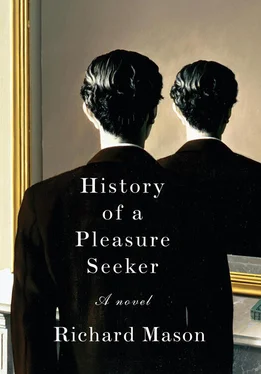“I am under orders to escort him to the brig.”
“I’m afraid I can’t spare him. Would you bring us a menu?”
“His name is not on the passenger list, sir.”
“I needed someone at the last moment and there were no cabins. He’s making do with the sofa in my sitting room.”
Maurice Moureaux knew Mr. Gruneberger was lying, and he also knew why. That he could do nothing about it was frustrating in the extreme. The junior stewards were silent, watching for his lead. “Fetch Mr. Gruneberger a menu, Laurent,” he said at last. “I am so sorry to have disturbed you, sir. And you, Mr. van Sigelen. Forgive my error.”
“Think nothing of it,” said Piet.
The three stewards bowed and retreated. Laurent returned with a menu.
“Mr. van Sigelen will have the turtle soup. Bring it with a bottle of Sancerre.”
“At once, Mr. Gruneberger.”
Finally they were alone. Subsiding adrenaline and hunger and the gentle rocking of the ship made Piet half delirious. When he could speak he said: “I am greatly in your debt.”
“Then you’re an honorable fellow after all. Are you dangerous, as they say?”
It did not seem to Piet that there was anything to be gained from lying to his unexpected benefactor. “I broke into first class to see a friend who’s a steward,” he confessed. “We used to work at the same house in Amsterdam.”
“You both left to come on the ship?”
“He lost his place because of me. Then I lost mine. We ran into each other on deck.”
Jay Gruneberger suspected that this encounter had not been wholly coincidental, but he did not propose to direct the talk towards a potential rival. “What did you do to lose your position?”
“I’m too ashamed to say.”
“Then you must keep your counsel, Mr. van Sigelen. Though in my experience confiding a burden can ease it. I promise you discretion.”
“My name is Barol, not van Sigelen.”
“Glad to hear it. The van Sigelens I know are vile.”
The waiter came with the wine.
“Drink it quickly. A glass will calm you.”
Piet did as he was told and they shook hands. “At least tell me how you were exposed, Barol.” Jay spoke as if requesting the day’s gossip at his club. “Often the denouement is more interesting than the details of what led to it.”
“I tried to eat in the grill room. I didn’t know you had to give a cabin number.”
“I don’t mean on the ship. I mean in Amsterdam.”
Piet hesitated. “Someone said something that was true. No one had thought of it before she said it.”
“About you?”
“About me and someone else. A lady.”
“A relative of the speaker.”
Jay said it as casually as if he had heard the story days before. His precision was disconcerting and Piet drank another glass of Sancerre. When it was finished, he said: “Her mother.”
“And I presume that you and this lady’s mother …”
“Only once.”
“You were caught at the first attempt? How very unresourceful.” Gruneberger smiled. He never minded if a fellow did not like other fellows. In some ways he preferred it, since recollection made infinite embroideries possible. It was often better than an unsatisfactory half hour concluded in mutual embarrassment.
Piet did not wish to seem wholly incompetent. “We met often. It was the last time that gave us away.”
“I thought it only happened once.”
“We only once did everything one might do.”
“I see.” Jay had a calm, authoritative way of asking questions that elicited answers. At shareholder meetings, men who had spent years honing the art of subtle evasion found themselves lulled by his calm, courteous pursuit of knowledge. Piet Barol had not had a candid conversation for so long that the lure of one was strong. Under the influence of a stranger’s gentle prompting he found that there was much he longed to share. He did not mention the Vermeulen-Sickertses by name or give any details that might establish their identity, but he told Jay all that had happened on the Herengracht.
The experience was immensely relieving. When the Sancerre was finished they had a cognac and by now the room was noticeably emptier. The most worldly person Piet had ever met was Maarten Vermeulen-Sickerts, who was as conservative as a medieval monk by comparison with his new confessor.
Like the rest of fashionable New York, Jay Gruneberger was never sincerely shocked. He took Piet carefully to the epicenter of his drama, guiding the narrative to the details of what exactly he had done with his employer’s wife. Being told this story by an engaged and passionate Piet Barol, leaning forward in his chair, the scent of sweat rising from him, a cognac balloon in his vast hands, was to Jay Gruneberger a form of pleasure so heightened, so rare and refined, that it far excelled the merely erotic. He had a mind capable of considering many perspectives, so while he absorbed every detail of Piet’s story he was also able to float into a vaguer place, where all he heard were the low notes of his voice and all he saw were his face, glowing and happy again, and his thick neck and his dark blue eyes.
At length a regretful steward told them that the salon had closed.
“You’d better take the sofa in my sitting room.” Jay made the suggestion in the tone he used when offering a colleague a ride home from the office. “There’s no way of getting you back before morning.”
“I don’t know how I’ll ever get back.”
“My cabin steward will be on duty at breakfast. I’ve known him fifteen years. He’ll take you to your own part of the ship and no one will be any the wiser.”
“They’ll do an inspection and find me.”
“That won’t happen now I’ve vouched for you. That’s the Loire Lines’ great thing. They never embarrass one.”
“Then I accept with gratitude.”
They left the room and went down a wide corridor. “I take this suite because it’s quiet. The disadvantage is it’s a damned slog when you’ve had a few and there’s no private deck.”
Jay had waited in his secluded corner of the salon as long as he could, hoping that his friends would have gone to bed by the time Piet Barol accepted his hospitality. He was relieved to encounter no one he knew — though he was ready to introduce his new assistant with aplomb, should he be required to. In the end he was not. They stopped outside a pair of double doors flanked by four pillars. Above them, beneath the line’s shell and crossed L s, were the words CARDINAL RICHELIEU.
The decorative centerpiece of the Richelieu Suite was a copy of the famous portrait by Philippe de Champaigne, from which the room’s predominant colors were also borrowed. Champaigne’s Richelieu was ruthless. The Eugénie ’s copyist had caught his robes of rose and gray but softened his expression, the better to complement the atmosphere of the ship. He surveyed the room like a discreet and approving voyeur. It was wonderfully quiet, with dark mahogany paneling to chest height. Piet and Jay sat down on a sofa upholstered in pale blue velvet and their talk ran on. Having relieved himself of his story, Piet had developed a sincere interest in his rescuer.
Jay Gruneberger was not used to self-revelation, having had cause to master the habits of discretion. But their unusual introduction and the frank cordiality it led to allowed a spontaneous trust to arise between them. Piet’s questions were as perceptive as his own had been. He found himself describing his childhood in Cincinnati, his meeting with his wife when she was six and he eight. He had often told the story of how he and Rose had climbed trees together long before falling in love. What he did not often say was that his father and mother had despised each other and used their only child as a foot soldier in their strife. He confided this in Piet Barol and learned a great deal about Herman and Nina in return.
Читать дальше












